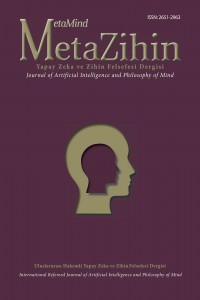[Konuk Makale] [Kierkegaard’ın İroni Kavramı ve Romantik İroni Üzerine Eleştirileri]
Kierkegaard, ironi, romantik ironi, Schlegel, var oluş alanları
[Guest Paper] Kierkegaard’s Concept of Irony and his Critiques on Romantic Irony
Kierkegaard, irony, romantic irony, Schlegel, the spheres of existence,
___
- Beiser, F. C. (2003). The Romantic Imperative. Cambridge- Massachusetts & London: Harvard University Press.
- Firchow, P. (1971). “Introduction” in Friedrich Schlegel’s Lucinde and the Fragments, ed. P. Firchow, 3-39. Minneapolis: University of Minnesota Press.
- Gardiner, P. (1988). Kierkegaard. Oxford & New York: Oxford University Press.
- Gonzalez, A. (2014). “Humor” in Kierkegaard’s Concepts: Envy to Incognito. ed. J. Stewart, W. McDonald, and S. M. Emmanuel, 175-182. England: Ashgate Publishing Limited.
- Jothen, P. (2014). Kierkegaard, Aesthetics and Selfhood: The Art of Subjectivity. England: Ashgate Publishing Limited.
- Kierkegaard S. (1989). The Concept of Irony with Continual Reference to Socrates. trans. H. V. Hong, E. H. Hong, New Jersey: Princeton University Press.
- Kierkegaard, S. (2009). Concluding Unscientific Postscript. ed. and trans. A. Hannay, New York: Cambridge University Press.
- Kylliäinen J. (2009). Living Poetically in the Modern Age: The Situational Aspects of Kierkegaard’s Thought. Helsinki: University of Helsinki.
- Lippitt, J. (2000). Humour and Irony in Kierkegaard’s Thought. Great Britain: Palgrave Macmillan.
- Pattison, G. (1998). “Art in an age of reflection” in The Cambridge Companion to Kierkegaard.” ed. A. Hannay and G. D. Marino, 76-100. United Kingdom: Cambridge University Press.
- Rasmussen, J. D. S. (2005). Between Irony and Witness. New York & London: T&T Clark International.
- Schlegel, F. (1971). “Lucinde” in Friedrich Schlegel’s Lucinde and the Fragments, ed. and trans. P. Firchow, 42-140. Minneapolis: University of Minnesota Press.
- Schlegel, F. (1971). “Critical Fragments” in Friedrich Schlegel’s Lucinde and the Fragments, ed. and trans. P. Firchow, 143-159. Minneapolis: University of Minnesota Press.
- Schlegel, F. (1971). “Athenaeum Fragments” in Friedrich Schlegel’s Lucinde and the Fragments, ed. and trans. P. Firchow, 161-240. Minneapolis: University of Minnesota Press.
- Söderquist K. B. (2003). “Kierkegaard’s Contribution to the Danish Discussion of ‘Irony’” in Kierkegaard and His Contemporaries: The Culture of Golden Age Denmark. ed. J. Stewart, 78-105. Berlin & New York: Walter de Gruyter.
- Thielst, P. (2003). “Poul Martin Møller: Scattered Thoughts, Analysis of Affectation, Struggle with Nihilism” in Kierkegaard and His Contemporaries: The Culture of Golden Age Denmark. ed. J. Stewart, 45-61. Berlin & New York: Walter de Gruyter.
- ISSN: 2651-2963
- Yayın Aralığı: Yılda 2 Sayı
- Başlangıç: 2018
- Yayıncı: Murat ARICI
Tractatus Logico-Philosophicus'ta Metafizik Ben ve Dünya'nın “Sub-Specie Aeternitatis” Görünümü
Bilincin Doğasına Yönelik Beş Temel Yaklaşımın Bir Değerlendirmesi
[Fenomenal Bilinç Problemi: Betimleyici ve Kategorik Bir Analiz]
Kindi'de Zihin-Beden Etkileşiminin İmkanı
[Konuk Makale] [Kierkegaard’ın İroni Kavramı ve Romantik İroni Üzerine Eleştirileri]
